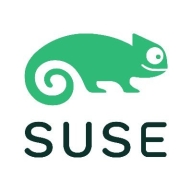

SUSE Linux Enterprise and AlmaLinux compete in the Linux distribution category. SUSE Linux Enterprise often has the advantage due to its robust security features and professional support, while AlmaLinux stands out for being cost-effective and community-driven.
Features: SUSE Linux Enterprise provides advanced security tools, system rollback capabilities, and options for high-performance computing, making it suitable for enterprises with stringent security needs. AlmaLinux offers compatibility with CentOS environments, known for its stability, and embraces an open-source model, appealing to users who value community collaboration.
Ease of Deployment and Customer Service: AlmaLinux is characterized by straightforward deployment, supported by a strong community and extensive documentation, making transitions from CentOS seamless. SUSE Linux Enterprise offers professional customer service and comprehensive deployment support, ideal for complex infrastructure environments needing dedicated support resources.
Pricing and ROI: SUSE Linux Enterprise requires higher setup costs due to licensing and support fees, providing strong ROI through its stable, secure infrastructure, minimizing long-term risks. AlmaLinux, being free, results in minimal initial investment, with ROI driven by low maintenance costs and adaptability, favored by enterprises prioritizing budget-conscious, sustainable solutions.

| Company Size | Count |
|---|---|
| Small Business | 8 |
| Midsize Enterprise | 11 |
| Large Enterprise | 22 |
AlmaLinux is an open-source, enterprise-level Linux distribution designed to provide stability, high performance, and community-driven support. It offers compatibility with RHEL, making it a reliable option for businesses seeking robust OS alternatives.
Built by CloudLinux, AlmaLinux serves enterprises looking for a powerful Linux distribution. It boasts seamless transitions from CentOS, providing a familiar environment for IT teams. With its open-source nature, AlmaLinux empowers organizations by offering control over their workflows. It supports diverse workloads, making it suitable for handling anything from basic setups to complex architectures. AlmaLinux stands out due to its strong security features, which focus on protecting sensitive data and maintaining secure server environments.
What are AlmaLinux's most important features?AlmaLinux has been implemented across industries like finance, healthcare, and technology due to its reliability and adaptability. In finance, it ensures secure transactions and data integrity. Healthcare organizations rely on it for managing sensitive patient data. Tech companies use it for its stability and community-driven enhancements, making it a versatile choice for diverse applications.
SUSE Linux Enterprise offers features like YaST for server management, seamless integration with Oracle and SAP, and a robust security setup. Renowned for stability, it efficiently supports workstations, SAP workloads, and cloud migrations across diverse industries.
SUSE Linux Enterprise is known for its lightweight design, high performance, and ease of installation. Its flexible architecture supports extensive documentation and efficient patching. The system uses the BTRFS file system for effective virtualization, and community support is significant. However, challenges include package updates causing conflicts, difficult initial setup and software management, high pricing, and support response times. Improvements in security compliance, cloud integration, hardware compatibility, and documentation are also needed.
What are SUSE Linux Enterprise's important features?
What benefits should users expect from using SUSE Linux Enterprise?
Industries like healthcare and banking use SUSE Linux Enterprise for secure transactions and structured application deployment. It is also a choice for organizations involved in testing, automation, and web development, offering support for SAP HANA integration and facilitating cloud migrations.
We monitor all Operating Systems (OS) for Business reviews to prevent fraudulent reviews and keep review quality high. We do not post reviews by company employees or direct competitors. We validate each review for authenticity via cross-reference with LinkedIn, and personal follow-up with the reviewer when necessary.